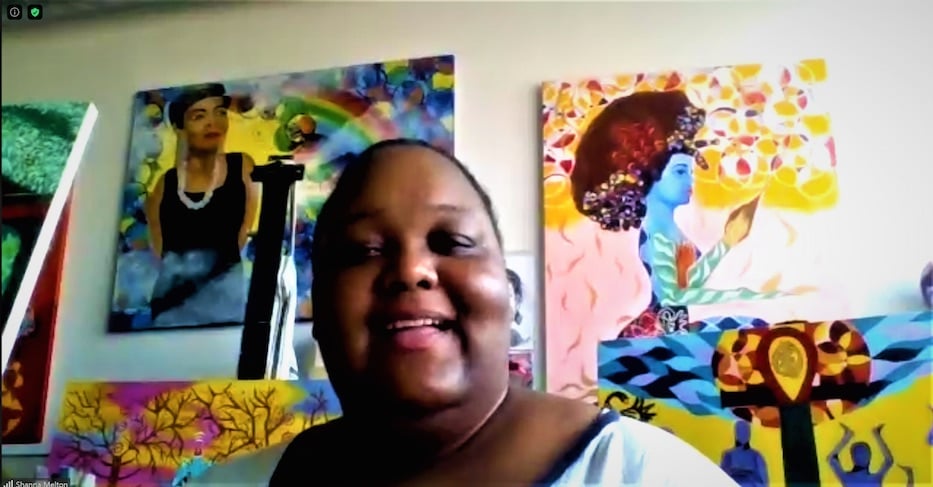
Bridgeport | Creative Writing | Arts & Culture | City Lights Gallery | COVID-19

| Shanna Melton leads the group. Screenshots from Zoom. |
Eleven faces filled the screen. Each was taut—a slate with pursed lips and two eyes made murky with memory. Some wrote about their own experiences. Others pondered society at large. All of them contemplated the same question: “How did we get here?”
On a recent Sunday, 11 budding creatives gathered for The Writer’s Group with Shanna T. Melton, the Bridgeport born-and-raised founder of Poetic Soul Arts. Melton, who was a nominee to serve as the 2019 State of Connecticut Poet Laureate, founded The Writer’s Group as a workshop in January of 2014.
Pre-pandemic, the seminar met at Bridgeport’s City Lights Gallery on a bimonthly basis. Its success prompted its spread throughout the state: Melton has spearheaded the workshop at spaces including LifeBridge Community Services, New Beginnings Family Academy, M’Bellish Café, The New Canaan Library, People Get Ready Bookspace and regional branches of The YMCA. Currently, the group meets weekly over Zoom, sponsored by the City Lights Gallery.
Melton opened the event with a five-minute period she dubbed “Awkward Silence.” Her challenge: Be still. As in, completely still.
“Don’t fiddle-faddle with anything,” she said. “Don’t get up and move around. You’re still, you’re focused, and you’re taking in deep breaths. In the gallery, we would normally take in our atmosphere, but you can take in your atmosphere even if you already know it. Close your eyes—some people pray, some stretch. Relax.”
It was as if she had uttered a spell: writers could have heard a pin drop. Every face on the screen sat in silent repose. It was a dignified stillness. Some eyes were closed. Some stayed open and stared at figures and items beyond their small screens. A man leaned his forehead on folded hands, lips whispering a silent prayer. Remarkably, there was no ambient noise in any of the attendees’ homes; the environment heeded Melton’s will.
A phone alarm’s trill broke the calm.
“Time is up,” Melton declared. “We’ll begin our free write.”
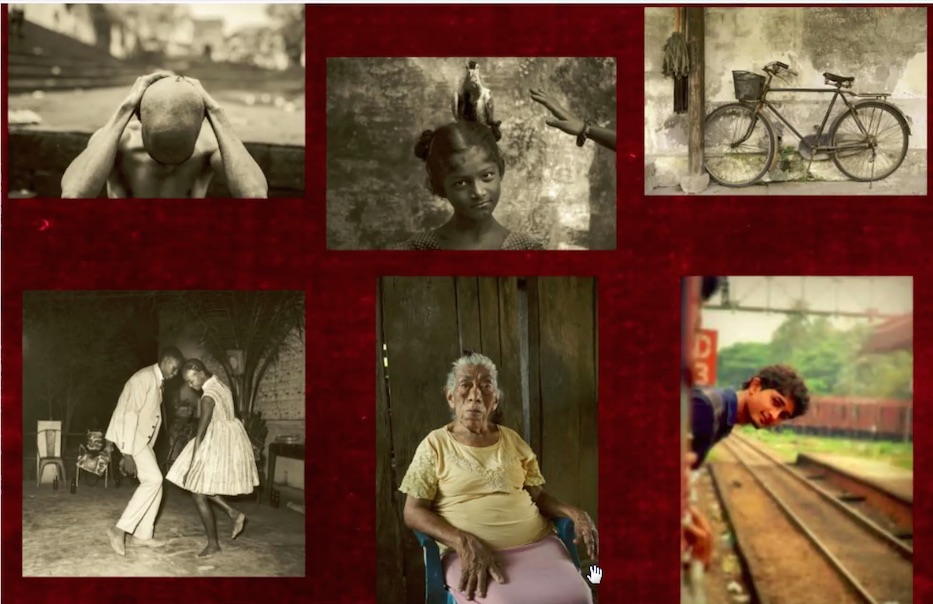
| Melton drew on a series of photographs for her prompt. |
Attendees took out their journals and wrote about whatever was in their head—no judgment, no scribbles, and no pauses. Each physicalized a stream of consciousness from ballpoint to pad. They wrote about whatever was in their head— “It’s so hot,” or, “I like my hair today,” were Melton’s examples. The task required no revision; it was a warm-up for the mind and pen.
Another chime from Melton’s phone signaled the segment’s end.
“Our theme for today is ‘How did we get here?’”
The reaction from the group was mixed—curiosity with a touch of skepticism. Melton laughed.
“I knew you were gonna make those faces! It could go in a lot of ways.” Melton shrugged. “I also know that considering the state of the world, there’s some obvious ways to take.”
She shared her screen for the group to see. “I actually went in the way of photography, ’cause a lot of times I see pictures, other people’s images, and I get inspired.”
Her screen displayed six pictures, three monochrome and three brightly colored. Each was a different scene, a different person, and perhaps, a different age. Melton noted that viewers’ perceptions of each were purely subjective. She went through each picture, listing potential writing threads—playfulness, youth, mirth, sorrow. Once attendees latched on to an idea, they could pinpoint an event that exemplified it.
“There’s only one rule—it’s the only rule that we have,” Melton said. “What happens in Vegas stays in Vegas, even if this is the Internet. Whatever you create, you can do it in a safe space. Whatever you create, you don’t have to create from a place of concern about sharing."
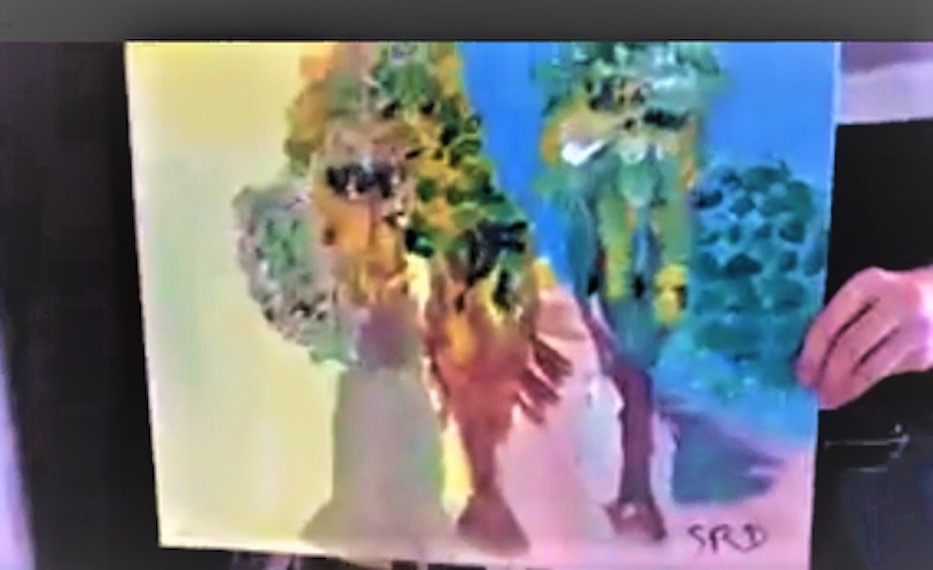
The group nodded in agreement and launched into 20 minutes of silent writing. Some penned prose and others penned poetry. Every face pinched in focus and deep concentration. The quiet wasn’t tense—it seemed to bubble with excitement, the potential of what each member would produce.
Finally, Melton’s phone alarm signaled the shift into a peer workshop. Members began raising their hands to share their works. Scott Davis went first.
“When I was deciding what to do, to go on about a travel-talk with Jeff Davis or a journey to Red Mango to be surrounded by food and paint, I chose the food and paint.”
Davis’ description of his journey was vivid—a bus ride to a restaurant, snacking on salty chips and dip, sweet cookies and cream, and finally, an outdoor painting session with friends. Blank, white canvases stood out in stark contrast to rolling greens. Davis picked up a brush, swirled it in acrylic, and put paint to canvas. By the session’s end, he’d created “three dancing trees in a grove that looked more like fish.”
Over time, he read, he’d seen his art improve leaps and bounds. Yet, he still couldn’t shake the fear of applying paint to canvas, the whispers of judgment and malice in his mind that reminded him his work was imperfect. As he read, he reflected on what the world had been through. He contemplated the “state of the world’s coronavirus.” He remembered seeing the Challenger explosion during his college years.
Each could paint a picture on Blank canvas. Each rendered Davis a “beach laid bare, waiting for the tide to roll in.”
“I realized creativity is a journey and a terrain that I need to plant my feet on, so I can bless others once again,” Davis finished.
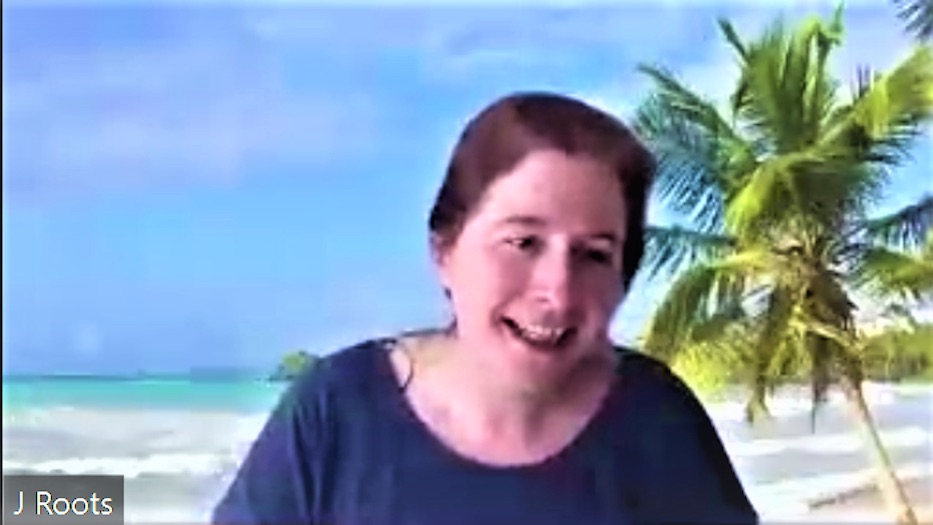
Julia O’Rizzi volunteered for the next reading. She stepped right into the current moment.
“Thank you, thank you,” she began. “How did we get here? The x-knee on the y-neck? The one believing that they have the right power and authority over the other? We are all human beings. We are all piss and vinegar and energy wrapped in muscle with a skin coating. How did we get to the point that one type of piss-sack with power—power of the gun, badge, and handcuff—believe themselves to be judge, jury, and executioner of other, differently-colored piss sacks?”
O’Rizzi’s prose was an emotional plea for an end to white supremacy. She explained how it felt as a white woman to live in a country built by enslaved Black people, the bitter bile that she could taste at the back of her tongue and her waves of indignation and shame. She described how it felt, as a white woman, to watch George Floyd’s execution.
“I couldn’t contain the hurt and the sadness or the pain for this innocent man, his family, his friends, and his community,” she said. “How did we get here, after centuries of people owning people? I guess some folks wish they still did. That moment—all 8 minutes and 46 seconds of it … it’s forever etched in my psyche, forever etched in our country’s psyche, and all the many-colored piss-sacks that call America home. After so many centuries, we still can’t adjust; we still haven’t offered reparations. Why do cops still think they can kill Black and Brown people indiscriminately, without reprimand or consequence?”
O’Rizzi began to sob as she described the horrific nature of George Floyd’s murder, in detail. She choked out a tearful vow to do whatever she could in the face of “Her community’s silence.” O’Rizzi left the piece unfinished, having expressed her rage and pain and allowing others venting room. The group mourned with her.
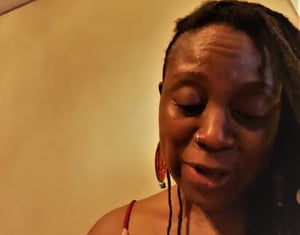
Medria Blue-Ellis, who’d given thoughtful commentary throughout, mused on death’s prolific quality. The thought launched a greater discussion on death’s ironic, and often heartbreaking, efficacy.
George Floyd’s murder had been the catalyst to push discrimination and police brutality to the national stage. Trapped in quarantine, there was no choice but for every eye to look at the system’s broken state.
“A lot of us are trying to understand what our way is of responding to what’s happening right now, especially those of us who are writers,” Fisiwe Zwana Freeman said. “Sometimes we question how important are words are, so discussions like this are very encouraging.”
Freeman wound down the workshop with prose. She described “the day I felt I truly recognized that my mother was a woman like me,” fellow writers listening through their screens. The realization had come to her in an altered state, cutting through the high of a good spliff.
“I knew it was a life-altering moment because I suddenly saw her—felt her—in a way that I never had before, and it rocked me,” she said. “Literally, the vehicle of this revelation was love and weed all cozied up together real sexy-like and intimate.”
She took a deep breath and continued, voice even and measured. The words were viscous and heavy.
“In that instance, I became spiritually aligned with my mother in our womanhood, as I recounted memories of my childhood and began to examine those memories with a lens of compassion.”
The words felt fresh from a wound scabbing over, a flake away from pain and infection.
“I remember a question in my mind: ‘How did I not know this before?’ I saw her efforts to maintain a household full of children and the joys and rigors of marriage as I once had. I saw her face in moments of tribulation, despair, disappointment, and unspeakable love, and I knew I recognized her in my soul.”
One last pause.
“The fullness of this encounter filled me with a storm of tears and sobs that shook my body with emotion. It put me in such a state that all my man could do was hold me as I tumbled through it in a shivering fetal folded ball of Brown woman. I don’t know how long it lasted. How did I transition out of that moment? I don’t remember, but I would guess in a heavy sleep.”
If you want to participate in Melton’s next Writer’s Group, click here.

